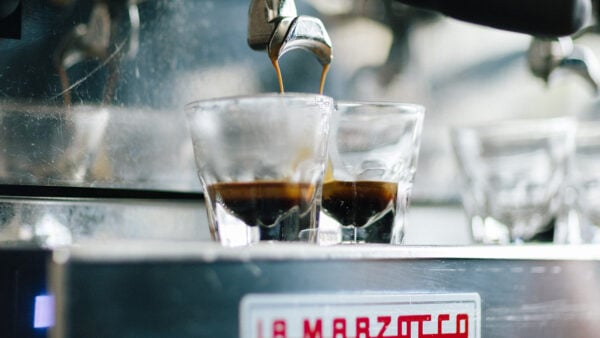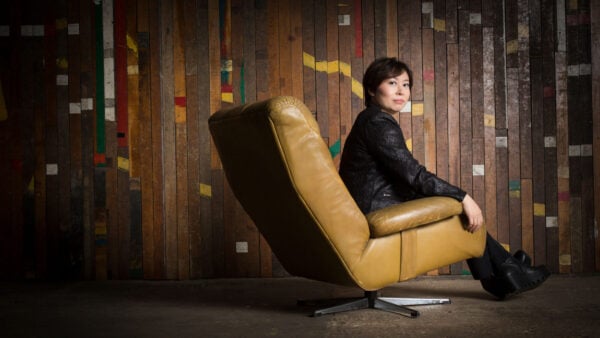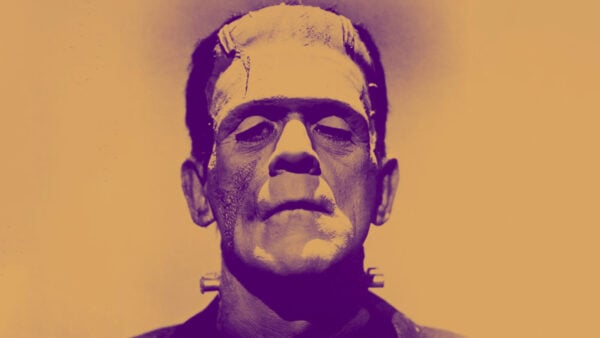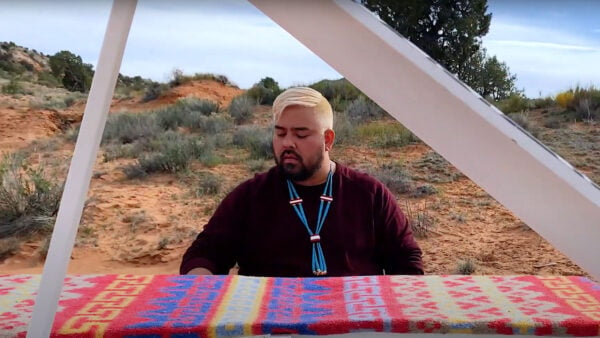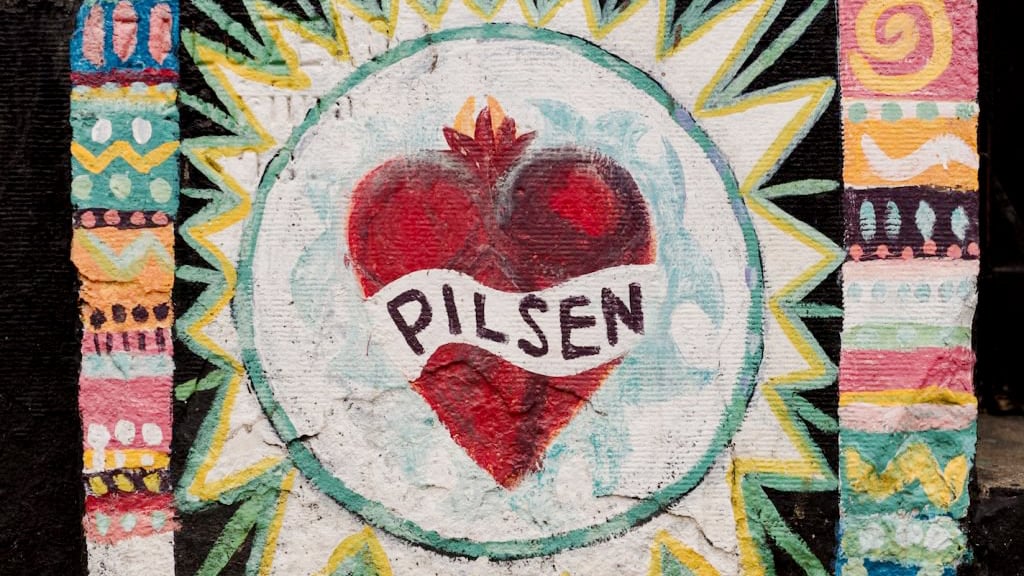
A mural in Pilsen by Jo Dufo located at 1438 18th Street, Chicago. 2016. Explore more murals of Pilsen here.
If there’s any neighborhood in Chicago where a Czech swing orchestra and an Afro-Latin funk band can share a stage, it’s Pilsen. The neighborhood has been home to diverse music and musicians since its early history and today it remains a musical melting pot of traditions from around the world.
Though now most Pilsen residents are Hispanic or Latino, in the late 1800s, most were Czech. Many other immigrants from Poland, Lithuania, Germany, and Croatia also lived there at the time. Though the neighborhood’s namesake – a then popular Czech café called At the City of Plzeň – is a testament to the strong presence of the Czech community in the 19th century.
In 1892, John Dusek, a Czech tavern owner, built Thalia Hall, modeled after the U-shaped opera houses in Prague, as a public space for art and entertainment. There, audiences could hear operas performed by the Ludivik Players, the hall’s resident company who came to Pilsen from Prague, or the Bohemian Opera. In the 1920s, vaudeville was more popular than opera. Soon, audience demand for motion pictures out paced that for live performance.
At the same time, Mexican immigrants began to settle in Pilsen, creating their own cultural institutions. Musical groups like the Banda Mexicana of South Chicago and the Royal Castilians brought the sounds of Mexico to the neighborhood as early as the 1920s. But by the early 1960s, as Thalia Hall struggled to pack houses showing films, movie theaters showing Mexican movies and music flourished. Famous singing actors would make promotional appearances at local movie houses like the Tampico and the San Juan, taking ticket buyers away from Thalia Hall.
In the 1960s, Thalia Hall closed to the public and fell into disrepair, though it was named a historical landmark in 1985. In 2013, developers remodeled Thalia Hall to host three spaces: a restaurant, a bar, and the main hall. Two years later, Glamour magazine listed Thalia Hall as one of 5 Striking Wedding Venues (Some Brand-New!) That You Need to Know About. In many ways, the story of Thalia Hall is the story of Pilsen's changing demographics. A business built by European immigrants failed when it no longer served Latino and Hispanic residents who became the new majority in the middle of the 20th century. Now, the Hispanic and Latino population of Pilsen has decreased from 39,144 in 2000 to 27,693 in 2015, while the white population has grown from 3,587 to 18,564 during those same years. In spite of changes in the community, Pilsen residents like Álvaro Obregon have found ways to preserve Mexican musical traditions. In 2013, Obregon founded the Chicago Mariachi Project to teach young musicians the art of mariachi through a special partnership with Benito Juaréz Academy.
Mariachi music has made its way from Mexico City to Chicago’s Civic Opera House by way of Pilsen. Lyric Unlimited, Lyric Opera of Chicago’s community engagement initiative, has produced two mariachi operas, Cruzar la Cara de la Luna, and El Pasado Nunca Se Termina. Each was presented at both Benito Juaréz Academy and the Civic Opera House. For mainstage performances of both mariachi operas at the Civic Opera House, singers of many musical traditions were joined by an onstage band, Mariachi Vargas de Tecalitlán, considered one of the leading ensembles of its kind in the world.
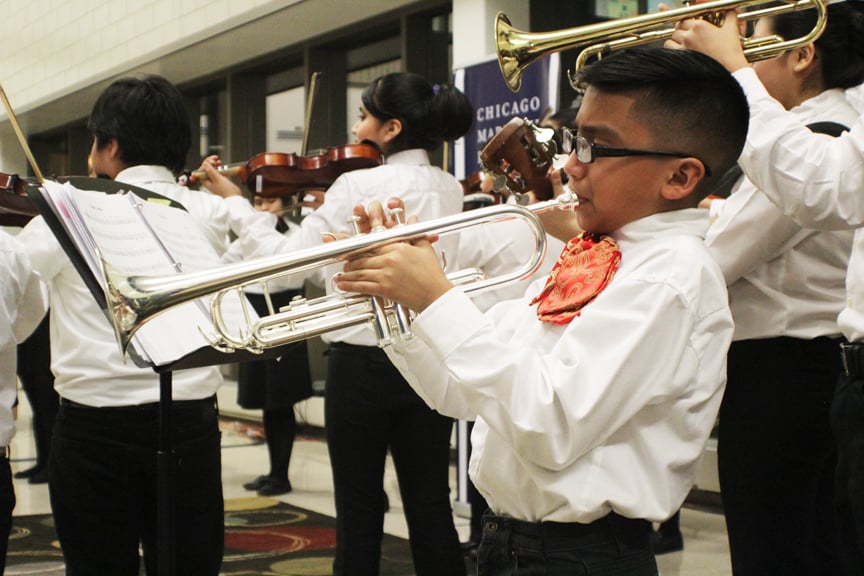
One of the Mariachi Academy ensembles of the Chicago Mariachi Project provided a postlude at Benito Juaréz Academy (Photo: Stephen Raskauskas)
Lyric Unlimited director Cayenne Harris said she hopes new commissions like these “will resonate with many different communities in Chicago.” When one Pilsen resident attended a preview performance of El Pasado at Benito Juaréz in 2015 with his wife and three children, he said that “We usually wouldn’t go see something like this,” though after seeing Lyric’s first experiment with mariachi opera at Benito Juaréz in 2013 and enjoying it, “we thought we would come and see this one too,” he said. In November 2016, the Chicago Symphony Orchestra, as one of many efforts to engage with communities in Pilsen, offered a pop-up concert with world-renowned cellist Yo-Yo Ma at Café Jumping Bean. This performance was part of the annual Bach Marathon, presented by the Civic Orchestra, CSO’s training program for emerging professional musicians. Civic also performs several times per season at the National Museum of Mexican Art as part of its Civic Chamber Music series.
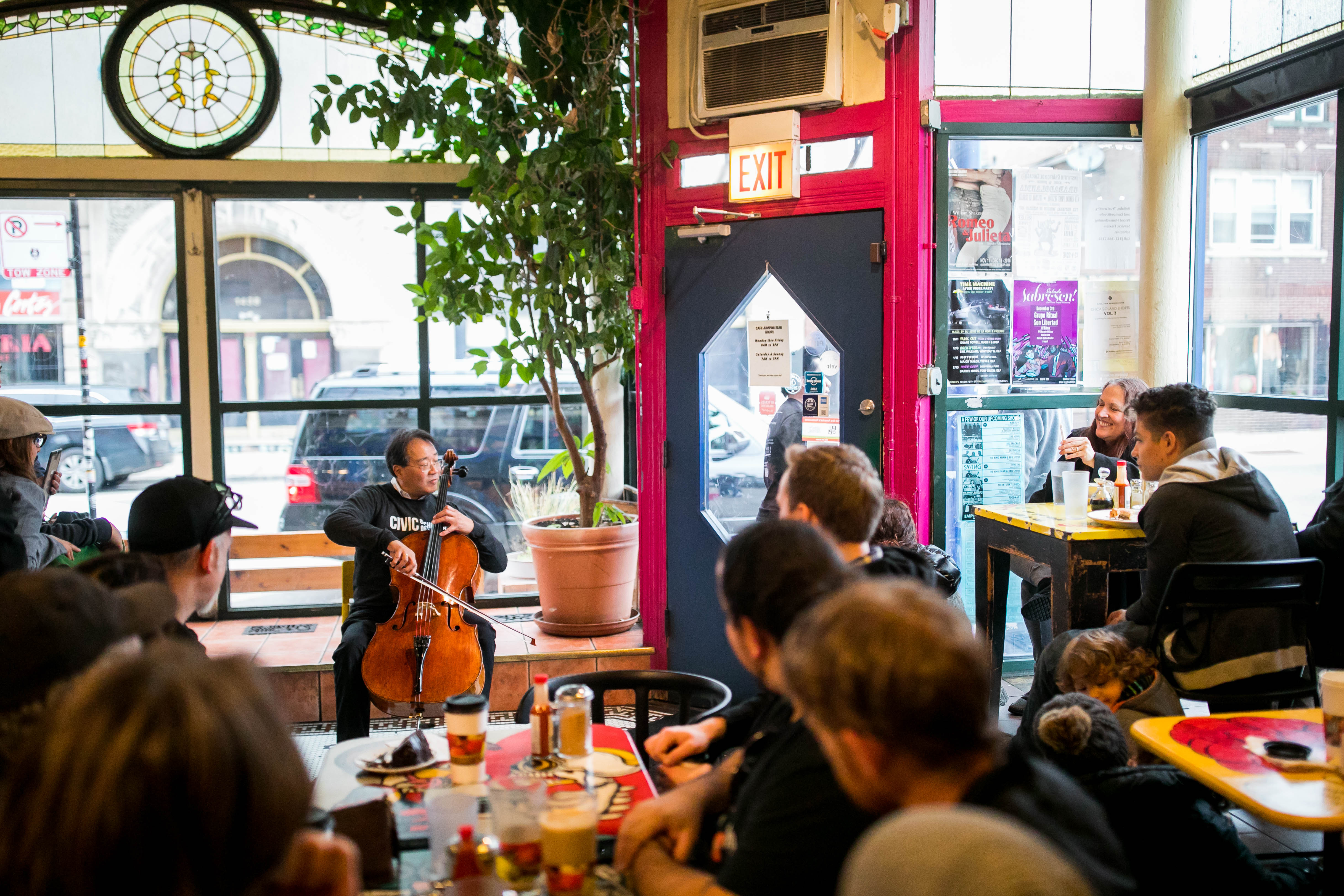
A pop-up performance by Yo-Yo Ma at Café Jumping Bean in Pilsen as part of Civic Orchestra of Chicago's Bach Marathon 2016 (Photo: Todd Rosenberg)
In the last year, Pilsen has also seen the emergence of new arts organizations and businesses. Production company Barrelhouse Music opened a studio space on Halsted Street in March 2016. Co-founder Grant DeNapoli said he was attracted to the “cutting-edge” artistic community in Pilsen. DeNapoli said he and his colleague have created music and sound for the Ubisoft video game Watch Dogs 2, and have also done musical spots for advertisements for Gatorade, Kiwi Shoe Care, and Chicago’s Museum of Science and Industry. In addition to creating original music for other companies, DeNapoli hopes Barrelhouse can also provide services for local bands and musicians, or even touring artists that come through Pilsen to perform at venues like Thalia Hall. Music in Pilsen also spills into the streets through several annual summer festivals. One of the oldest festivals in the neighborhood is Fiesta del Sol, which began in 1972 as a celebration of the Pilsen Neighbors Community Council’s (PNCC) role in the successful building of the Benito Juárez Community Academy. For the last five years, Pilsen Fest, formerly known as Unisono, has presented a free arts and music festival that draws visitors from around Chicago and beyond. Though founded only in 2015, Ruido Fest has already made a lot of noise in Addams/Medill Park.
One recent festival, Prague Days Chicago, celebrated Pilsen’s connections to both the Czech Republic and Mexico. In 2015 the consulate general of both Mexico and the Czech Republic joined the Mexico City and Prague Committees of Chicago Sister Cities International to celebrate Prague Days Chicago. An event called “This is Pilsen: Bohemian Past, Latino Present” put together what might seem like an unlikely mix of musical acts: the Czech big band orchestra Ondřej Havelka and His Melody Makers, singer and guitarist Vivian García, and ¡Esso! Afrojam Funkbeat. Mariachi may be one of the first genres of music that comes to mind when thinking of PIlsen. But learning more about the neighborhood’s past and its people explains why Pilsen has been home to many musical traditions from polka to post-modern jazz. Visit My Neighborhood: Pilsen for stories from the people who are transforming their community from the inside out.


